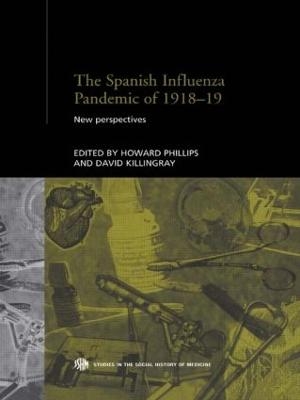
The Spanish Influenza Pandemic of 1918-1919
Routledge (Verlag)
978-0-415-23445-0 (ISBN)
The Spanish Influenza pandemic of 1918-19 was the worst pandemic of modern times, claiming over 30 million lives in less than six months. In the hardest hit societies, everything else was put aside in a bid to cope with its ravages. It left millions orphaned and medical science desperate to find its cause. Despite the magnitude of its impact, few scholarly attempts have been made to examine this calamity in its many-sided complexity.
On a global, multidisciplinary scale, the book seeks to apply the insights of a wide range of social and medical sciences to an investigation of the pandemic. Topics covered include the historiography of the pandemic, its virology, the enormous demographic impact, the medical and governmental responses it elicited, and its long-term effects, particularly the recent attempts to identify the precise causative virus from specimens taken from flu victims in 1918, or victims buried in the Arctic permafrost at that time.
Howard Phillips, South African by birth, studied at the University of Cape Town and London University before joining the staff of the History Department at UCT in 1974. Since completing his doctoral thesis on the impact of the Spanish flu pandemic on South Africa (which was published in 1990), he has researched, taught and written on the medical history of South Africa. In 1998, together with David Killingray, he organised the first international conference on the influenza pandemic of 1918–19.David Killingray was born in 1939. He studied at the London School of Economics, the University of York, and the School of Oriental and African Studies where he gained a PhD in African history. He was a school teacher for 12 years in the UK and Tanzania. In 1972 he joined Goldsmiths College, University of London, where he is now Professor of Modern History. He has written books and many articles on aspects of African, Imperial, Caribbean and English local history, and has just completed a book on African soldiers in the Second World War.
Introduction, Howard Phillips, David Killingray; Part 1 Part I Virological and pathological perspectives; Chapter 1 A virologist's perspective on the 1918–19 pandemic, Edwin D. Kilbourne; Chapter 2 Genetic characterisation of the 1918 ‘Spanish’ influenza virus, Jeffery K. Taubenberger; Part II Part II Contemporary medical and nursing perspectives; Chapter 3 The plague that was not allowed to happen, Wilfried Witte; Chapter 4 ‘You can't do anything for influenza’, Nancy K. Bristow; Part III Part III Official responses to the pandemic; Chapter 5 Japan and New Zealand in the 1918 influenza pandemic, Geoffrey W. Rice; Chapter 6 Coping with the influenza pandemic, Mridula Ramanna; Part 4 Part IV The demographic impact; Chapter 7 Spanish influenza in China, 1918–20, Wataru Iijima; Chapter 8 Flu downunder, Kevin McCracken, Peter Curson; Chapter 9 The overshadowed killer, N.P.A.S. Johnson; Chapter 10 Death in winter, D. Ann Herring, Lisa Sattenspiel; Chapter 11 Spanish influenza seen from Spain, Beatriz Echeverri; Chapter 12 A holocaust in a holocaust, Patrick Zylberman; Chapter 13 Long-term effects of the 1918 ‘Spanish’ influenza epidemic on sex differentials of mortality in the USA, Andrew Noymer, Michel Garenne; Part 5 Part V Long-term consequences and memories; Chapter 14 ‘A fierce hunger’, James G. Ellison; Chapter 15 ‘The dog that did not bark’, Myron Echenberg; Part 6 Part VI Epidemiological lessons of the pandemic; Chapter 16 Transmission of, and protection against, influenza, Stephen C. Schoenbaum; Notes; Bibliography, Jürgen Müller; Index;
| Erscheint lt. Verlag | 12.6.2003 |
|---|---|
| Reihe/Serie | Routledge Studies in the Social History of Medicine |
| Verlagsort | London |
| Sprache | englisch |
| Maße | 156 x 234 mm |
| Gewicht | 748 g |
| Themenwelt | Geschichte ► Teilgebiete der Geschichte ► Kulturgeschichte |
| Studium ► Querschnittsbereiche ► Epidemiologie / Med. Biometrie | |
| Studium ► Querschnittsbereiche ► Geschichte / Ethik der Medizin | |
| Studium ► Querschnittsbereiche ► Infektiologie / Immunologie | |
| ISBN-10 | 0-415-23445-X / 041523445X |
| ISBN-13 | 978-0-415-23445-0 / 9780415234450 |
| Zustand | Neuware |
| Informationen gemäß Produktsicherheitsverordnung (GPSR) | |
| Haben Sie eine Frage zum Produkt? |
aus dem Bereich


